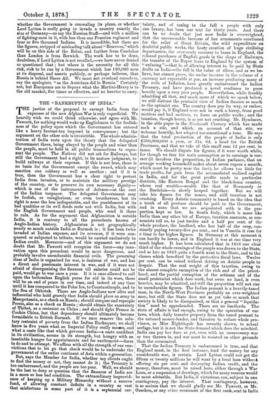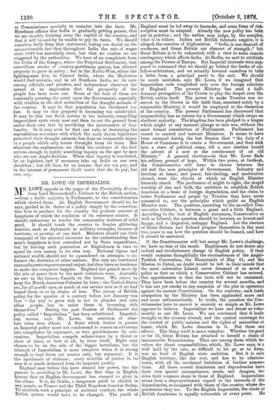THE "BANKRUPTCY OF INDIA."
THEpolice of the proposal to exempt India from the expenses of the new Afghan War is only superficial. We heartily wish we could think otherwise, and agree with Mr. Fawcett, for nothing would wake up Englishmen to the foolish- ness of the policy upon which the Government has entered like a heavy Income-tax imposed in consequence ; but the argument on the other side is irresistible. The whole adminis- tration of India rests upon the theory that the delegated Government there, being obeyed by the people and wiser than the people, must be held in all public transactions to repre- sent the people. The Natives did not ask for Railways, but still the Government had a right, in its mature judgment, to build railways at their expense. If this is not true, there is no basis for the Government except the sword, which may sanction one robbery as well as another ; and if it is true, then the Government has a clear right to protect India from invasion, or to maintain the military prestige of the country, or to preserve its own necessary dignity— which is one of the instruments of defence—at the cost of the Indian taxpayer. The delegated Government may be foolish, or vainglorious, or even treacherous, but its right is none the less indisputable, and the punishment of its bad qualities or its evil deeds rests not with India, but with the English Government and people, who send it there to rule. As for the argument that Afghanistan is outside India, it is contrary to all the precedents known of Anglo-Indian history. Afghanistan is not geographically nearly so much outside India as Burmah is ; it has been twice invaded at Indian expense, and its revenue, if it were con- quered or subjected to tribute, would be carried exclusively to Indian credit. Moreover—and of this argument we do not doubt that Mr. Fawcett will recognise the force—any inno- vation upon this precedent would be most dangerous, and probably involve unendurable financial evils. The governing class of India is organised for war, is desirous of war, and has a direct and passionate interest in war, and if it were not afraid of disorganising the finances till salaries could not be paid, would go to war once a year. If it is once allowed to call upon the bottomless English purse for aid in its wars, there will be an end of peace in our time, and indeed at any time until it has conquered to the Polar Ice, to Constantinople, and to the Sea of Okhotsk. There are Anglo-Indians now alive and influential who hold gravely that India should place an army in Mesopotamia, as a check on Russia ; should conquer and repeople Persia, also as a check on Russia ; should obtain the suzerainty of Thibet, as a restraint on China ; and should fight France in Cochin China, lest that dependency should ultimately become formidable to British Burmah. If we once remove the salu- tary restraint of poverty from the Indian Exchequer, we shall know in five years what an Imperial Policy really means, and what a caste like that which governs India—a caste confident in its civilisation, serene in its strength, but hungry with ani insatiable hunger for appointments and for excitement—dares to do and to attempt. We affirm with all the strength of our con- victions that to let go that check would be to undertake the government of the entire continent of Asia within a generation.
But, says the Member for India, whether my clients ought to find the money or not, they cannot do it ; the Treasury is too embarrassed, and the people are too poor. Well, we should be the last to deny or question that the finances of India are in a more or less bad condition. The extraordinary improvid- ence
of keeping up a Military Monarchy without a reserve fund, of allowing constant deficits in a country so vast that misfortune in some part of it is a septennial
cer-
tainty, and of taxing to the full a people with only one luxury, has been our text for thirty years. And there can be no doubt that just now India is overweighted, that the unreasonable increase of her armaments sanctioned for the relief of Great Britain, the wild expenditure on doubtful public works, the hasty creation of huge civilising departments, the over-ready recourse to loans in England, the colossal purchases of English goods in the shape of Railways, the transfer of the Rupee loans to England by the system of " enfacing "—that is, of allowing interest to be paid by State drafts on India—the fall in the value of silver, and as we be- lieve, but cannot prove, the undue increase in the volume of a currency not exportable at par, an increase producing many of the evils of Inflation, have greatly embarrassed the Indian Treasury, and have produced a novel readiness to press heavily upon a very poor people. Nevertheless, while frankly admitting all that, and much more of which we speak below, Iwe still distrust the pessimist view of Indian finance as much as the optimist one. The country does pay its way, or rather, would pay it, if England were not in such a hurry, from good motives and bad motives, to force on public works ; and the taxation, though heavy, is as yet not crushing. Mr. Hyndman, in the able paper in the Nineteenth Century which has made such a stir, and which, on account of that stir, we welcome heartily, has adopted too sensational a tone. He says that the total production of the people of India is only £300,000,000 a year, or 31s. 6d. a head for the British Provinces, and that we take of this small sum 12 per cent. in taxes. We should dispute his figures, if it were worth while, for though we fear his main assumption as to earnings is cor- rect (it involves the proposition, in Indian parlance, that an average working household makes about seven rupees a month, which must be pretty near the fact), he allows too little for trade profits, for gain from the accumulated realised capital in India, and for the great profits made in particular districts, like Eastern Bengal and the black-loam country, where real wealth—wealth like that of Normandy or the Bordelais—is slowly heaped together. But we will take his figures for the nonce, and still taxation is not crushing. Every Asiatic community is based on the idea that a tenth of all produce should be paid to the Government, and in none that we are acquainted with is the pro- portion kept so low. In South Italy, which is more like India than any other bit of Europe, taxation amounts, as eco- nomists tell us, to just twelve and a half per cent. of the whole produce, the landlord, who has half of the crop, con- stantly paying twenty-five per cent., and in Venetia it rose for a time to far higher figures. In Germany at this moment it can hardly be lower, and in England it was at one time very much higher. It has been calculated that in 1816 one clear. third of the whole earnings of the people was drawn to the State, and as late as 1843 quite a fourth went to the State, and to the classes which benefited by the protective fiscal laws. Twelve per cent. can be raised without driving an Asiatic people to despair. That the real weight of this taxation, owing to the almost complete exemption of the rich and of the priest- hood, and the partial exemption of the artisans and of the small proletariat which does work, but owns no land, is even
heavier, may be admitted, and still the proportion will not rise to unendurable figures. The Indian peasant is a heavily-taxed man, in the North-West Provinces probably an over-weighted man, but still the State does not as yet take so much that society is likely to be disorganised, or that a general " liquida- tion " need be apprehended. There are no landlords. The state of affairs is bad enough, owing to the operation of our laws, which daily transfer property from the taxed peasant to the untaxed money-lender, and threaten to reduce whole pro- vinces, as Miss Nightingale has recently shown, to actual serfage, but it is not the State demand which does the mischief.
India can pay her dues as yet, even with an unnecessary war or two thrown in, and war must be resisted on other grounds than the economical.
That the Indian Treasury is embarrassed is true, and that England must, in the first instance, lend the money for any considerable war, is certain. Lord Lytton could not get the fifteen or twenty millions he will want by a local loan without offering six per cent. and destroying Indian credit, and the money, therefore, must be raised here, either through a War
Loan, or a suspension of drawings, which for many reasons would be most advisable. But India, if victorious, can, subject to one contingency, pay the interest. That contingency, however, is so serious that we should gladly see Mr. Fawcett, or Mr. Goschen, or any other economist of the first rank, sent to India as Commissioner specially to examine into the facts. Mr. Hyndman affirms that India is gradually getting poorer, that we are steadily draining away the capital of the country, and that it will by-and-by be unable to pay its taxes. We should ourselves flatly deny that statement, basing our denial on the unquestionable fact that throughout India the rate of wages since 1848 has materially risen, but that we confess we are staggered by the authorities. We hear of no complaints from the Delta of the Ganges, where the Perpetual Settlement, that marvellous stroke of country-gentleman genius, has allowed property to grow in safety ; but in the North-West, where the fighting-men live, in Central India, where the Marhattas would find recruits, and in all Southern India, we do note among officials, and planters, and independent observers the spread of an impression that the prosperity of the people has been worn out. Some of the best of them are constantly pressing the point upon the Government, especially with relation to the slow extinction of the draught animals of the country. It may be that population has thickened too fast. It may be that property is becoming too subdivided. It may be that our fiscal system is too inelastic, compelling improvident ryots every now and then to cut the ground from under their own feet by sacrificing the instruments of hus- bandry. Or it may even be that our rule, in destroying the superstitious reverence with which the early Aryan legislators protected their draught animals, has done an irreparable injury to a people which only learns foresight from its fears. But whatever the explanation, we think the evidence of the fact serious enough to justify searching inquiry on the spot by men who are not Anglo-Indians. When that inquiry. is concluded, let us legislate, and if necessary take up India on our own shoulders ; but till then, let us assume that she can pay, and in the interest of permanent thrift insist that she do pay, her own way.



































 Previous page
Previous page